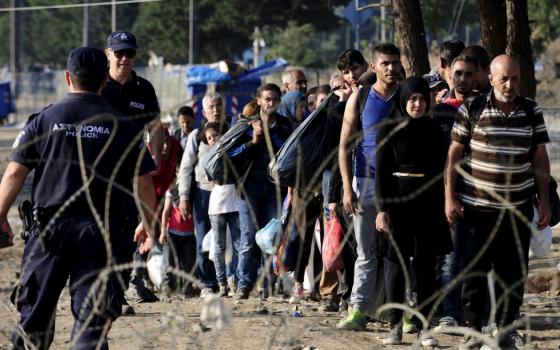It is a tragic fact of human history that sparking the world’s reaction nearly always requires an appalling act or an unspeakable horror before we act.
We wait until the crisis cannot be ignored before we stop ignoring it. Which forces the question: How many of these crises could have been mitigated — or avoided — had we acted sooner?
That being said, it is also a fact that over and over and over again we see that the very worst circumstances bring out the very best in humanity.
Last week, it was the refugee crisis in Europe, so potently symbolized by the photo of the body of a little boy washed up on a beach. The 3-year-old and his Kurdish family had been trying to travel by boat from Turkey to Greece, hoping to enter the European Union there and eventually reach Canada.
The photo and the stories of the plight of thousands of refugees stuck in Hungary seemed to finally have started a world-wide conversation on refugees. Finally.
Of course, this crisis didn’t start last week, or even last month.
People have been fleeing for their very lives from Syria for several years — and from Islamic State militants in Syria and Iraq for more than a year.
And for just as long — though neither the problem or the responses got the kind of attention that last week brought — people have been trying to help.
A great way to keep up on what’s happening, regarding both the crisis and the response, is through the Jesuit Refugee Services’ Facebook page. Not only is it constantly updated with news of the crisis, but the posts are public, meaning you don’t even have to have a Facebook account to view them.
Caritas officials in Macedonia report that from June to August, more than 46,000 refugees entered from Greece, with more than 37,000 of them originating in Syria.
From the situation that we witnessed from our field visit, it is obvious that the migrants are exhausted through lack of sleep. Their greatest needs — apart from a place to sleep — are water, food and hygiene materials.
Humanitarian organisations give the migrants in Gevgelija food, water and basic hygiene materials, but the main problem remains that they don’t have any accommodation. Thus, they sleep in the parks and in the open.
Caritas officials say they’re doing all they can, but with no letup seen in the foreseeable future, they say the European Union needs to step in with funding for temporary housing and hygiene.
In the United Kingdom, Lord Jonathan Sacks is urging something like a repeat of the Kindertransport, which rescued 10,000 mostly Jewish children from Europe on the eve of World War II.
“Europe is being tested as it has not been tested since the Second World War. . . . The European Union was created as a way of saying that we recognise human rights, after the catastrophe of two world wars and the Holocaust, and it’s very chilling to see some of these scenarios being re-enacted,” Lord Sacks told BBC2’s Newsnight on Thursday.
Sacks says the U.K. could take 10,000 refugees; others say it should take up to 25,000 — which would still be a fraction of Germany’s figures.
How great is the need? While thousands of refugees are straining European countries’ ability to shelter and feed them, Catholic Relief Services puts Europe’s efforts in perspective: Turkey and Lebanon are sheltering 3.5 million Syrian refugees.
“People have realized they won't be going home and turned to the European Union for longer-term solutions. While they've been shown compassion in some countries, this hasn't been the case everywhere,” said CRS spokesperson Kim Pozniak.
“These people aren't just migrating to Europe in search of a better life for their children: They're fleeing to protect them and save their lives, and this is something everyone can relate to,” she said.
Remember, links, tips and accounts of the response to any crisis anywhere in the world are always welcome at dstockman@ncronline.org.
[Dan Stockman is national correspondent for Global Sisters Report. Follow him on Twitter @DanStockman or on Facebook.]

